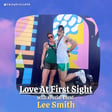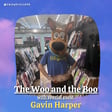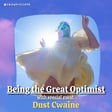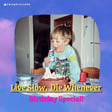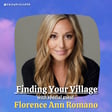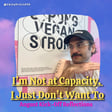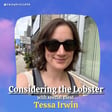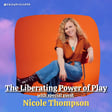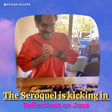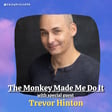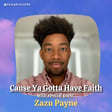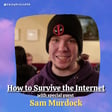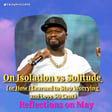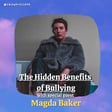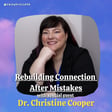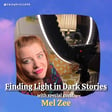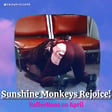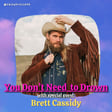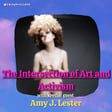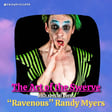Become a Creator today!Start creating today - Share your story with the world!
Start for free
00:00:00
00:00:01

Megan Kent
This week on Friendless I unfriend Megan Kent, Video Producer and former Donor Relations Coordinator. We discuss challenges in arts administration, learning to dance, missing bars, and Megan shares a harrowing account of internet stalking.
Support the show (https://www.buymeacoffee.com/friendlesspod)Transcript
Introduction and Guest Appearance
00:00:00
Speaker
Friendless is presented by the Saskatchewan Podcast Network. Hello, hello, my sweet babies. It's me, James Avermanco, intrepid host of Friendless, the only podcast about me losing all my Facebook friends one hour at a time. And also the podcast you're listening to right now.
00:00:30
Speaker
Huh. This week on the show I have Megan Kent, a local Saskatoon friend of mine. Megan is a video producer and former donor relations coordinator.
Impact of the Pandemic on Friendships
00:00:41
Speaker
We discuss challenges in arts administration, learning to dance, missing bars, and Megan shares an absolutely harrowing account of internet stalking. Fun stuff!
00:00:56
Speaker
If you stick around to the end of the episode, I have some really fun news about what's going on with Friendless this December, but that will be stuck at the end of the episode. That is then. This is now. So for now, let's dive right into the episode, lay back, and let the soothing tones wash over you with my interview of Meghan Kent here on Friendless.
00:01:31
Speaker
So, um, so, you know, before the interview or before the recording, we were talking very briefly about it. But, uh, but this is something I've been thinking about is that, you know, we, we, I guess I wouldn't say we saw each other regularly before pandemic, but like you and Brad are some of our best friends here. And so we.
00:01:52
Speaker
you know, saw each other on a pretty regular basis. And since pandemic, I mean, it's been maybe twice that we've like seen each other outside. And that's especially now with the snow. It's like, and it's just crazy to think like even people that we're quite close with, it's really difficult to stay connected to.
00:02:12
Speaker
Well it is and it also really makes me realize how how much it is important for me to see people's faces in person and the little things that I miss from like one of our activities we would always do would be to go out somewhere to a pub or a patio sit somewhere and just talk right it was you know
00:02:32
Speaker
a thing I underappreciated at the time not knowing that it was all going to get taken away but even just the you know you get into a little bit of like banter you're talking about something in your group and there's like that person who drops the perfect little joke at the right time everybody bursts into laughter I'm like
00:02:49
Speaker
I don't really have that in my life right now and I'm really feeling like it's missing so that in person just like you know the banter the shooting the shit the making jokes and just like spending time together is yeah it's really hard not to have that.
Digital vs. In-Person Interactions
00:03:04
Speaker
especially to because I think that it's a form of conversation that isn't replicable digitally. The way, because the way, you know, the way Zoom works, it's like you're looking at a wall of faces and each person has to take their turn because there's no way to branch, right? You know, they have those dumb like breakout rooms, but that's so like corporate and sterile and emotionless, you know, soulless. And
00:03:31
Speaker
And, and, you know, when you're in person, you know, if there's five people in a group, you could be having a full conversation together, but then you could break off and you could have little mini conversations and you could, then you could kind of weigh in on that and come back to the big conversation or you could interject or, and, and that's just, it's impossible on zoom. And it's the thing about.
00:03:50
Speaker
For me, I'm in full agreement with you. It's the thing about social interaction that I just haven't had in, you know, almost a year of this like very nourishing social, you know, I'm very much a very much an ambivert, right? I really like people until I don't. And then I have to be alone for a while and then I recharge, you know, but but it's it's something that I'm just I'm so lacking in. And I don't know. I don't know how or if we'll really
00:04:19
Speaker
you know, get it back anytime soon, right? Or when we, when we do get back to those situations, it's just going to be so overwhelming. Like it, we'll have to pace ourselves when we start to be able to, uh, you know, visit for long lengths of time in person inside somewhere.
00:04:34
Speaker
Yeah, I you know, it's it's it's so shocking to me to think that there are people who have just continued to do that kind of thing this year. It's so it's a brazen, it's so callous, but it's also like I'm so jealous of them. It's like it's like I wish I could I wish I could do that. I wish I had the the audacity to behave like that because it's it's such an important part of my day and of my life is to be able to socialize like that. And so, yeah, to go to a pub like and not
00:05:01
Speaker
be terrified of being inside for too long, you know? Yeah. Yeah, I definitely even notice when I'm out somewhere or I've, you know.
00:05:09
Speaker
I feel when I've, when I've maxed out on my in-person time, like it's so different now than it was before that I like get this visceral feeling of like, I need to get home. I need to be inside my walls. Like I've been outside in the wild for too long. So yeah, it's, it's a really weird switch cause I'm totally the opposite. I'm very extroverted, love to spend time around people and I'm, I've been like forced to make myself the other way.
00:05:33
Speaker
Right.
Megan's Career and Work-Life Balance
00:05:35
Speaker
And now, OK, so so I'd like to pivot a little bit and ask you about kind of what you've been doing with your days, because we'll talk about this very briefly about sort of how we initially met. But but where I'd like to but I'd like to sort of start at the end and then double back to it if we could. So so.
00:05:53
Speaker
Totally correct me because I'm going to be wrong. But from what I gather, you work with your with your your basically family film production company. Is that right?
00:06:05
Speaker
Yeah, so I work with one of my brothers and my sister-in-law and we have a video production company. It's about, I want to say it's, yeah, it's like two years since we, you know, founded the company. So we're still very young. Right. And there's been some advantages to that in that we, we've always been working from home. And so we've just continued to do that. But now I have a friend because Brad's also working from home. So I have a co-worker that I can like eat lunch with and
00:06:33
Speaker
take breaks with and all of that but um yeah yeah so the the the biggest thing that changed for me is just like with everything in the initial lockdown we didn't go out and shoot stuff and film stuff for a while so um but it hasn't changed too much for me from my work day to day because i do spend a lot of time in my home office sitting in front of a computer so it's somewhat similar
00:06:59
Speaker
And what's sort of like, what's sort of usual content for you? Like, is it sort of stock footage? Is it corporate? Like what kind of things are you usually filming?
00:07:09
Speaker
So we're usually making videos for other businesses, so to help them tell their story, to help them talk about a product or a service that they have. And that can be a huge range of industry that we work with. So we've worked with like a retail space that sells clothing, a gym that does like a gymnastics facility, other things that are a little bit more corporate,
00:07:36
Speaker
And we've also started to do live stream actually with COVID. It wasn't a thing that we did before, but we found there was a real need for it because people couldn't get together in larger group sizes. So that's been our big learning curve as part of the technical stuff for us this year. And we've been able to help some businesses out with that just to be able to access their audience, even though we're really restricted with what we can do in person. Of course. Yeah.
00:08:04
Speaker
So when we so so where we are now is you're working in this film company where we you and I initially met was you were my well I guess.
00:08:15
Speaker
Actually, it was before that, but you were working at Persephone Theatre as the donor relations coordinator. And I guess I'm curious, I realize it's a very, very broad term question, but what sort of got you into that position? Was it like, was it, do you have a history with theatre or was it just sort of a job kind of thing? Like, how did you get involved?
00:08:38
Speaker
Well, it goes back many years to, I guess to my university education, which I did in international studies with a focus on development. And so I always kind of had
00:08:52
Speaker
a little bit of an affinity for nonprofit sector work and someone who, like I do, I do art as well in other capacities, like not in theatre, but I'm a dancer and I also play music. So being able to bring that nonprofit and a performance art together, I was keen to learn more about it. And so when the opportunity came up, I knew someone who worked there who told me that there was a job available.
00:09:19
Speaker
I interviewed and I actually started working in box office before I did anything related to fundraising. Yeah, and got to kind of see how all of the inner workings of an arts organization happen, which was really neat. And I really enjoyed learning all of those things and met tons of really great people. Theatre people are really cool people. So it was it was awesome to get to work there for as long as I did.
00:09:44
Speaker
I really love those kinds of jobs of the, I don't know if they're administration per se, but they're, but they're managerial in that it's functioning. It's operational. It's, you know, the things about, you know, I love box office work. I love front of house work. I love donor relations work. You know, I was, you, you were my predecessor in that position. When you, when you left, I, I stepped into that and, uh, funny enough coming out of box office.
00:10:08
Speaker
I don't realize how similar that trajectory is. The thing for me, I think the thing that makes me, I don't know, not in an attempt to shit on anything, but it's like the problem is that theatres almost as a general rule are so dysfunctional that it makes jobs like those very difficult to thrive in.
00:10:29
Speaker
And, and which I find really tragic because I personally really enjoy those jobs, but they're very difficult to stay in long-term because of the sort of toxicity and dysfunction going on around it, you know? Well, and it's a little bit too, like with nonprofits, there's always a, there's always a budgetary thing that's different than if it's just a corporate, um, a corporate kind of regular business. Uh, so that, that can make it challenging too.
00:10:57
Speaker
And yeah, challenging is a great way of putting it. I'm using all my big words today. Um, so you mentioned you were a dancer and, uh, now you, I know you have put on shows now. Is that your, your run dance company or? No, I've been involved with it for a long time. So it's, uh, the school is dance, Egypt dance company. And they started in 1986 in Saskatoon. I see.
00:11:22
Speaker
So the two women who founded it, Elaine Mantique and Monica Kruger, they learned, so it's an Egyptian dance school, belly dance school. And they learned from a woman who immigrated from Egypt to Saskatoon and started teaching classes just out of her home. And they eventually crossed paths with her and became really involved. And she's someone who's just been an extension of their family over the years. And we've gotten to know her really, really well too.
00:11:51
Speaker
big supporter of the dance and comes to all of our shows and everything like that. So but I got involved. I think it's like almost I've almost been doing it since the first class I took from them was 20 years ago. So it's a big part of my life. Yeah.
00:12:07
Speaker
Right. And now you're teaching. And so so the show that we saw, this must have been, I guess, but close to two years ago now, is is that sort of a usual class sort of like final presentation or where does where would that land in the sort of general, I guess, programming of that school?
00:12:26
Speaker
Uh, well, it's, we have a group of people who, um, kind of, they, they want to perform and they want to learn choreography. So we have a dedicated group and, uh, that's, you know, we work on technique and we work on other things, but we also work on putting stuff together for stage.
00:12:43
Speaker
But we also just have regular classes for people who want to just move and try something different and do something creative and they don't necessarily have to be on that trajectory to perform, which I think is a little bit different from some dance schools where
00:12:59
Speaker
Normally you're learning with the end goal of performing, but our end goal for most of our students is just to get them to be able to be expressive with dance. So if they decide they want to do performance, that's an option too, but the focus is more for them to build their own.
00:13:16
Speaker
to build their own toolkit and to look like themselves as a dancer before we say, okay, now you're in a choreography with seven other people and you kind of all have to look a little bit alike. We like to develop the individual before we develop them into choreography where they have to look really similar.
Handling Online Privacy Threats
00:13:42
Speaker
You mentioned in your questionnaire that you had an experience with a stalker through Facebook. I did. Yes. Which I was like, I am a prime candidate to talk about why Facebook isn't great sometimes. You know, it's so funny because I, as a preface, you know, I often feel very uncomfortable with how easy it is for me to access people's information when it comes to preparing for these episodes.
00:14:07
Speaker
whether it's, you know, taking people's profile photos to make into my thumbnails or whether it's just knowing where they are. And so for someone like me who has little to no malicious intent to have that much access to information, I can't imagine what somebody who's looking to do harm is able to do. It basically just becomes like a directory, right? And online directory where you can like go and access someone or if you can't get
00:14:34
Speaker
through to them, you can access people who are in the circle around them, right? Through friends and all of that. So are you comfortable retelling this story? Is this, yeah, I can, it was a while ago, but I still, I mean, it's still very, um, it's still very vivid. And I feel like it's one of the reasons why you, one of the questions you asked in the questionnaire was like, what kind of stuff do you post or what do you share? And I'm like, I don't really.
00:15:00
Speaker
share that much, especially Facebook specifically, just cause it's, um, I find it's different than any other platform because I have all my family there and I have lots of my friends there. Whereas on other platforms like Instagram, I can make it a little bit more generic and it feels a bit more disconnected. Um, but it could also be from my experience with Facebook specifically. So, uh, so the person who.
00:15:28
Speaker
I dealt with, like this started, it happened over the course of a year and I was living outside of the province. I was living in Montreal still at the time. And it initially came through as like a few messages that went to the, there's that secondary folder that you have in messenger. That's the message requests when it's people who don't know you. This situation made me very aware of how all of that stuff works.
00:15:54
Speaker
And so it was like me and a couple of my friends that I was close with said that they got messages from this woman who was asking about information about me. And it was because she was seeing someone that I had dated and had broken up with. So she was wanting to know about
00:16:16
Speaker
me and what my relationship was with this person with my ex-boyfriend and everything like that and I just was like no not going down that road I don't want to have a conversation about this so I never actually responded to anything that she sent to me and I did have a couple friends who who got messages from her too but most of the most of it I just rolled off my shoulder because it's like oh well it's just
00:16:38
Speaker
someone who's trying to get information it's not a big deal I'll just ignore it and it'll go away but it was a about a year later and there would be periodic communication that I would just continue to ignore or delete or whatever and I remember it was it got really real in a very short period of time because she ended up contacting so this was around like
00:17:08
Speaker
2012, 2013, when I think Facebook had some sort of thing where it would update the program, but it would reset security settings or something like that. So at a certain point, my friends list was visible to people who weren't my friends, I think. And that's how she was able to get a lot of information.
00:17:30
Speaker
and reach out to people. So she basically contacted people primarily through messenger to ask about me and wanted to know details about what was going on. And she was sharing really weird information like inappropriate stuff and things that I didn't want to know about. But because Saskatoon is a city of a certain size,
00:17:52
Speaker
She also went to a resource known as the phone book where you could get people's landlines. And I had a few family members who were like the only person with that name in the phone book who on Facebook were listed as my aunt or my sibling or my cousin, right? Because Facebook also let you identify that, which I've always thought was a little bit of a weird thing.
00:18:15
Speaker
So she would call them and leave messages on their home phone. And I started to get really uncomfortable because with a phone book, you have people's phone numbers, but a lot of people have their address listed addresses. And like my parents were, were one of the numbers that she called and their address was listed in the phone book. And, you know, I had no idea who this person was, um, anything about what her intentions were. So.
00:18:41
Speaker
It was something that made me like, as it went on, it made me more and more anxious. And then there was one day I, uh, I was actually out for brunch with Graham, our, your, your friend and my, my youngest brother. And funny enough next week's episode.
00:18:58
Speaker
Well, he can, you know, he could totally talk about his point of view on this because he actually had to help me out with this. So we had, we went for brunch one day and there was just this flood of people who contacted me asking me, do you know who this woman is? Cause she's like, sent me a lot of messages about you.
00:19:16
Speaker
And I think within a 24 hour period, she contacted like two dozen people. So it was friends, it was family members of friends of mine. It was family of mine, like a lot of people in a short amount of time. And I remember finding this out, going back to Graham's car with him and just bursting into tears, being like, I don't know what to do. I was just like super overwhelmed and scared of stuff that I didn't know.
00:19:42
Speaker
So Graham was super, super helpful and very sweet. We went home because we were, we were both still at our parents' house at the time. And he actually called like the police station and said, you know, what do we need to do to put in a complaint about somebody who's been stalking, stalking someone online? And so he got all the things that I needed to know and, and kind of helped me get started with that.
00:20:10
Speaker
Yeah. So then it went from me being, you know, waiting for just the next thing to happen to kind of taking taking matters into my own hands a little bit. And the great thing was I the previous job I had had when I worked in Montreal, I was a paralegal. So I prepared the shit out of all of the documentation I had. So every like all of the messages that were sent, you know, I reached out to people and got them to send me the screenshots and stuff like that. And
00:20:40
Speaker
Did a great cover letter outlining everything. I was so proud of it, you know, how organized it all was. And then I took it down to the police station and filed it. And eventually they had someone who was assigned to my case and that the officer like went and did a visit at this person's house in person. And I think that was the reality check that was needed with all the stuff that was kind of digital and far removed.
00:21:06
Speaker
Right. And so, yeah, it ended with that the officer coming to to speak with me and telling me that she had been told, you know, you can't do this. And if you do, these are things that can happen. So, yeah, and that that was where it ended. And I mean, I was really grateful for all the people who didn't judge me when I reached out. I'm like, so can you check your your message requests and see if there's anything from a person with this name?
00:21:35
Speaker
It's so incredible that it's so incredible that it can be so easy to become obsessed with this digital world that we create for ourselves. And then just hearing the fact that like, oh, somebody showed up in person and that's when it became real for for them. Like, that's that's so shocking to me that we are able to create these fantasy worlds for ourselves that are so powerful and so real and yet evaporate like a breath of smoke.
00:22:01
Speaker
Yeah. And yeah, I was grateful that that's kind of all that was needed because in going through this, I talked to other people who also had stories and there's a lot of stories with stocking and stuff like that where it doesn't stop as easily. So I was really grateful for my case that that's kind of all it's been. And also really grateful that I was in a place where I could
00:22:27
Speaker
go into a police station and like feel really comfortable and you know, know that I was going to be helped and not judged or anything like that too. So definitely.
00:22:35
Speaker
Yeah, that it all it was such a weird thing to go through. And it still blows my mind when I think of, you know, oh, yeah, that's right. That did happen. You know, that was not too long ago, but it still feels like it's it's so long ago, like it feels like it's been part of a story I've told for for a while now. But for anyone out there who's looking for any tips and tricks, if you're dealing with an online stalker, the only thing I can recommend is to
00:23:04
Speaker
to not engage them. That ended up being a thing that was really important for me, especially when I went to go make a complaint was that this wasn't just like an online conversation that was happening. I had literally sent not a single reply to this person. So that was something that I'm glad I just had the instinct to not engage because it ended up being something that was really helpful when I'm like, make this stop, go tell this person to leave me alone. And I was able to get some help with that. So.
00:23:35
Speaker
God, it's again, it's just this thing you hear. So you time and time and time again with with, you know, any form of victimization is this is this idea of if you engage with them, it's somehow your fault. Right. You know, whether it's well, what were you wearing or whether it's what did you say to them or whether it's did you reply to this person sending you messages like it just time. And again, it becomes this framework of how did you bring it on yourself? And I just like.
00:24:04
Speaker
God damn it. Yeah. I was grateful that it wasn't ever in person because I actually, I started to get really nervous that like, you know, is this person going to know where I work and is, is she going to show up at my job? Like it's a small enough city. Are we going to end up in the same, you know, pub or whatever out later? And like, she would recognize me. I don't know that I would recognize her, but yeah, just very bizarre. And I'm like, no, this is not a way to
00:24:32
Speaker
live like I want to take it I want to take more control over this and I had lots of people who were really great and supportive and like I said not judgmental because it was kind of connected to like an ex that I had so I felt I felt a little bit embarrassed about it when I had to talk to people about it but everyone was super understanding and like I said
00:24:51
Speaker
There's, it surprised me how often people could say, oh yeah, I know someone who's dealt with this before. Really? Everybody sucks. Yeah, so bizarre.
00:25:07
Speaker
Wellness, however you define it, is achievable.
Defining and Maintaining Friendships
00:25:11
Speaker
You don't even need to figure it all out yourself. Talk to Connexus. They'll give you guidance, motivation, and the push you need to reach your goals. They've got you. They're your financial partner, and they know you can achieve your very best, your financial best. Prove them right. Start right at Connexus Credit Union.
00:25:35
Speaker
So, you know, as I, as I've sort of caveatted before on the show, um, a big heart of the herb, the root of the heart of this show is very much about have I been a good friend and, and what have I done to be a good friend? And the way I've been exploring getting to the bottom of that is trying to figure out first and foremost, what the fuck even is a friend. Um, so I'm curious, um, how you would personally define friendship.
00:26:07
Speaker
This, I found this to be a hard question because yeah, I, this is going to sound a little bit cheesy, but to me, it's like, it's really a feeling or how somebody makes you feel. Um, but it's just for me, it's people that I, you know, feel comfortable being around and who I can laugh with and.
00:26:29
Speaker
who are just like we can have great conversation. Those are some of the things I think with a lot of my friends, that's what really attaches people to me are those kind of qualities like someone who can talk and just be open, someone who can be a little bit weird and not judgy and be fun to be around and fun to laugh with.
00:26:56
Speaker
But yeah, I have a hard time defining what exactly that is because I also feel that I have a great collection of friends who we are friends in different ways and they show friendship in different ways. I have some friends who they're regular with checking in, especially with COVID. It's kind of weird because you don't see people as much.
00:27:18
Speaker
They're sending memes all the time, like people who just do that like constant digital communication. And then there's other people who I go, you know, weeks or months not talking to. And then as soon as we talk, it's like you're putting on, you know, this super comfortable sweater that is like, it just fits and feels so good. And you're like right at home right away.
00:27:39
Speaker
And I feel like those are different kinds of friends. So it's hard for me to like pick specific stuff because it's, I think it's about having just a good collection of people around you.
00:27:50
Speaker
I love that. You know, for me, it's, I think a lot of it comes down to personal, you know, I have a lot of anxiety and I have a lot of, I have a lot of really ingrained like trust issues, not only with people, but with myself. And so a lot of the times when I'm asking these kinds of questions and when I'm exploring them, it's because I'm trying to figure out if I believe myself about
00:28:18
Speaker
what I'm trying to do and what I'm trying to accomplish. And I, I have this funny experience where when I'm with somebody, I, you know, I trust them almost implicitly.
00:28:28
Speaker
It's only mostly when I'm alone that I, I get trapped in my sort of thoughts of like, ah, they don't really mean that I don't really mean anything. And you know, all those kinds of those sort of intrusive thoughts that sort of wear you down, uh, uh, when you're alone, right. And so, you know, for me, friendship really roots itself in trust and vulnerability. And, and I think, um, I wish I was better at maintaining more connections than I am. So what does maintaining a connection mean?
00:28:59
Speaker
Well, you know, I guess I'd see again, it comes down to this thing of like, I think when I'm in touch with somebody and we're talking and I'm engaged with them, I feel really good. And then I worry afterwards that I'm not doing enough to, whether it's cultivate or nourish or maintain that connection.
00:29:16
Speaker
Um, and, and then I'd rather sort of, you know, not rather, I will more naturally slip into a sort of cycle of self loathing about what I'm doing wrong rather than just break it and reach out. I totally get that too. And one of the things that especially early on in, in COVID that I realized was how much, how much in-person time I use for validation in my relationships.
00:29:46
Speaker
Like just being able to see someone and see, I don't know, maybe it's their body language or something. Like all of those layers of communication that we can do in person.
00:29:55
Speaker
And when it would be a while and I hadn't talked to someone or hadn't heard from someone, those thoughts pop into your head and it's like, did I say something last time we talked? Yes. Or was I supposed to? Am I dropping the ball somewhere? But then I do the same thing to other people. I don't think twice, right? Where I won't reach out until it's the time that my brain decides it wants to think about it. Exactly.
00:30:22
Speaker
And I do find that like, you know, I, I trip myself up a lot with this idea that like you say exactly of like, I'm not blaming other people. So why am I blaming myself for it? You know, and, um,
00:30:34
Speaker
Yeah, I don't know. I don't know. I think it's for me, it's it's easiest to trust somebody in person because of all those things you're describing, because of body language, because of nonverbal communication. I also, you know, as somebody who writes every day and who writes text messages and emails and, you know, and then also, you know, poetry and blah, blah, blah. Like I know how controlled language can be.
00:31:02
Speaker
So I have a really hard time to internally trust someone's writing when that's what, when they're sending texts or when they're sending email or whatever it may be. It's a lot more easy for me to trust somebody in person because I can, I can not, I'm like, I'm not some savant. I'm not like, cause I can brain read you or whatever it is. Yeah. Well, that bullshit, but it's just like, it's just, I find it easier to be in person with somebody.
00:31:29
Speaker
to believe what they're saying. Whereas if we're over text or we're something more, you know, unpersonal, it creates that extra barrier of interpretation that my my brain has trouble with, you know. Yeah. Yeah, for sure. And yeah, it's that a little bit of self sabotage we all get good at doing every once in a while where, you know, it's easiest to blame yourself. Right. So we go, oh, well, this is something I did or oh, it's something I said or it's something I didn't do, which is why
00:31:59
Speaker
you know, this person isn't reaching out to me because, you know, I'm not, I'm not being a good friend to them or something like that, but it's all just.
00:32:08
Speaker
It's the brain just like pushing the panic button. And it's like that old lizardy part of the brain that like needs to run from a tiger. But in this case, the tiger is like a modern day problem. And it's like, oh, we have to freak out about something. So, yeah, it is that thing too of, um, of, you know, there's this saying about like,
00:32:30
Speaker
Or what I was thinking about was like, it's a lot easier to be nice to other people than it is to be nice to yourself. And so like very often, like I won't be thinking badly about people. I'll be like, Oh yeah, they're busy. They've got stuff to do. They're taking care of their life. But then with me, I'm like, how dare you, James? How dare you not write to that person? What the fuck is wrong with you? Why aren't you being a good, you know, and it's like,
00:32:52
Speaker
And there's this saying that I first encountered in the comic book saga, and I actually think it's kind of a bastardization of a David Foster Wallace quote. I think I'm right about that, but I'm probably wrong. I've never read any of his stuff. But anyway, the saying is, don't worry what people are thinking about you because nobody's thinking about you.
00:33:11
Speaker
You know, it was it was one of your Inktober illustrations I scrolled through on Instagram. Oh, yeah. And there was like a little stick person falling into a pitch or something like that. But the little quote I did, I screeched, I did a screenshot because it just like it was one of those things that kind of, you know, slapped me in the face that day with with stuff that I was thinking about. But it said, the world isn't out to get you. It can't be bothered.
00:33:37
Speaker
And I'm like, yeah, that's a good thing. As much as we calculate all of our things that we do in relationships and work and all of this other stuff, those things are not even on other people's radar. And we could save ourselves a lot of time and a lot of personal torment, just realizing that, yeah, and on the scale of things, this is not, no one else is thinking about this except for you.
00:34:10
Speaker
you know, with the world the way it is, with lockdown probably impending, hopefully, you know, with the number of cases we've got. And with the way that we're interacting, what do you think it's going to take to be a good friend heading into 2021?
00:34:31
Speaker
Well, first and foremost, near and dear to my heart are well curated memes that to me, I am a friend and I'm thinking of you because I'm saving the funniest shit for you. Yeah. Yeah. And just such a good one. But honestly, there's, there's so many, uh, group chats I have where, you know, memes are a good part of the flow of conversation and I really appreciate it. Um,
00:34:58
Speaker
Yeah. And I guess like it's so, it's so hard to think about what even being a friend is going to be like in the winter during a pandemic. Like that's the big challenge because at least over the summer, definitely, you know, we were able to get together in a backyard and be socially distanced and, you know, get to see each other in person, but you just can't do the same thing. You can maybe go for a walk, but you can't take like six people for a walk together and I'll be able to hear each other talk.
00:35:25
Speaker
Um, yeah, so I don't know a lot. It'll, it'll be a different kind of thing, but just, you know, little bits of effort I think are going to make the biggest difference. So even if it's a meme, if it's a little message, if it's a saw this and thought of you kind of thing, I think that's going to become a little bit more about, you know, checking in and being a friend for me in 2021 is just to try and let people know, you know, I'm still thinking about you, even though we haven't seen each other in forever. So.
00:35:55
Speaker
I think that that's such a great piece of advice. I think rather than worrying so much about that big overarching be a friend like by breaking it down into it's almost like I was doing this I was doing this class the other day and it was talking about having I forget the right word for it is essentially was like cumulative goals. So it's like
00:36:18
Speaker
you know your goal might be to write a book but that's a really big really scary imposition so instead what you should say is my goal is to write the best chapter i can this week or whatever it might be you know or write five good sentences who cares you know like just break it down into something that's actually palatable for you and i think the idea of
00:36:41
Speaker
good friend is so imposing, especially, I mean, for somebody like me who's like just riddled with anxieties, that I feel like something very easy, like just send a text, just send a message, just send a meme, make somebody smile, right? That is what it's gonna take to be a good friend right now. Nobody can make grand gestures.
00:37:09
Speaker
Um, and I think people who are making grand gestures are kind of assholes because it's like, go home, stay inside. We don't need this right now. No, you're using all your energy up at once. You're going to burn out, spread it out over time. So yeah, I love that idea of just like, just send a meme, just be, be gentle and be nice. Right. But, uh, what about for you? What, um, what does it take to be a good friend in 2021? Like, and through the winter.
00:37:38
Speaker
Fuck if I know, I think that's why I'm asking everybody else because I'm like, I don't know what to do. I'm like, you know, I have so much anxiety just going to the grocery store and then I stay inside. I just don't go outside. I go for walks with Jenica and then I stay inside and I, you know, and so like in terms of what it's going to take for me to be a good friend, I wish I fucking knew. I, um.
00:38:02
Speaker
I almost think I'm going to need to be a little even more reclusive for a bit because I think I need to like figure out what it is I'm trying to do and who it is I'm trying to communicate with and why. A whole element of this show and of just my general engagement in social media is that I don't
Social Media Skepticism and Conclusion
00:38:25
Speaker
I don't really believe in it. You know, I don't really believe in social media. I don't really believe that what it's doing is good for us. I don't think we need to know what everybody's doing at all times. I don't think it's good for us to be refreshing as often as we can. And then, you know, this is me trying to like clutch my pearls and say, Oh my God, we're, you know, the, the, the sky's falling. But I just, I do think that the way we interact with social media is deeply unhealthy. And so, um,
00:38:52
Speaker
So in a way, I think the way I'm going to need to be a good friend is by being less of a friend to people. And if, you know, this feels sort of like passing the buck, but it's like I'm sort of in a place where I kind of need people to reach out to me. And it's a little selfish, I'm sure, but like I'm sort of in a place where I need to really protect myself and my family, you know, you know,
00:39:22
Speaker
and the people that we, we, you know, like our, our family and, and, um, and so it's really, I'm in a place where I'm sort of like, if you, you know, you know where to find me, you know, like if you need me, I'm easy to get ahold of, uh, I'm really bad at reaching out though. So I think, I think, you know,
00:39:40
Speaker
Yeah. Yeah. Like I say, I don't, I'm not proud of it, but I think, I think for me, I need people to, to come to me and Megan. Fuck. We could, we could talk for hours. Um, um, I don't even know how this hour has gone by as fast as it has.
00:39:58
Speaker
You know, it's one of the really magic things, you know, you talk about, you talk about, you know, slipping into, to, you know, comfortable conversation with friends. And, and I think for me, that really truly is the root of it. You can always tell who a good friend is by how easily time passes, you know, and, um,
00:40:17
Speaker
Uh, and I feel, you know, I feel so grateful to know both you and Brad, and I just think you're just such wonderful people. And I think, but I also think you as an individual is really special. Like, I don't, I don't want to like, I hate that. Like, and you are now a unit, so you're one person.
00:40:33
Speaker
No, and I really appreciate you saying that and I feel the same way too about you and Jenica and it's just been so wonderful to to become friends with both of you like as a couple and individuals too and Yeah, I look forward to when there's no snow outside and we can actually hang out again in person and visit it'll be so nice
00:40:52
Speaker
Oh, fucking dare to dream. We do have one last thing we got to do though, before we wrap this up. So I am pulling up your Facebook. So here we go. Oh boy. We'll rip it like a bandaid. Meghan Kent. We are no longer Facebook friends.
00:41:12
Speaker
I guess we'll just have to continue to hang out on Instagram like we already have been. Exactly. It's no great loss.
Closing and Promotions
00:41:34
Speaker
And that's it. Thank you once more to Megan for coming on the show. I wish her and Sweet Brad all the best going into 2021, and I hope sincerely someday we can all get back together and sit in a bar without the lingering anxiety that we might be signing our death warrants for overpriced warm draft beer.
00:41:54
Speaker
If you like the show, let your friends know. Share the links on all your social medias. Let the world know about Friendless and all the great stuff that we're doing over here. And please don't forget to give the show a 5 star review wherever you listen. In fact, pull your phone out right now. Open up the player and just click that 5 star right away so you can just get it over with.
00:42:14
Speaker
I won't wait because I trust you, and I love you, and I know you're going to do it because that's the kind of relationship we have. Thanks, you're such a good friend. December rolls ever on, and with that comes all the trappings of late-stage capitalism. If you're still looking for a fun, unique gift for the reader in your life that not only supports art but also charity, and has low environmental impact, oooh.
00:42:43
Speaker
Why not pick up my latest ebook? Butt-Head just launched for just $10. You will get over 100 pages of my very best poetry from over the last couple of years. I am incredibly proud of the writing, especially the newest chapbook edition, I think is some of the best writing I've done. And I just don't think you want to miss it.
00:43:04
Speaker
The average advent calendar is still available for just a dollar a day. You will get a new piece of writing in your inbox every morning from the first into the 25th. If you haven't signed up yet, don't worry. Just buy the past and you'll get all the past writing and then you'll be kept up to date with the new stuff.
00:43:19
Speaker
go to friendlesspod.com slash shop or find me on all social medias at friendlesspod to get all those goodies. That's it for me. Next week I'm chatting with one of my best friends in Saskatoon and funny enough Megan's little brother Graham Kent. You don't want to miss that one. It's a great time but that is then and this is now. So for now I want you to have a wonderful week. Be gentle with yourselves and others and I'll catch you later. Fun and safety y'all.
